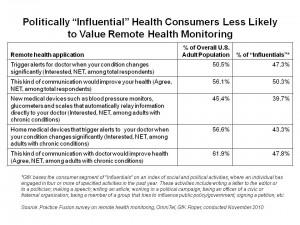 I posted here yesterday on Practice Fusion‘s survey on consumers’ views of remote health monitoring, discussing a key finding that older Americans are less keen on the idea than younger people. The company sent me more detailed survey data which I’ve dug into, and discovered a counter-intuitive finding worth exploring: “Influential” people appear less interested in remote health monitoring than the mainstream American.
I posted here yesterday on Practice Fusion‘s survey on consumers’ views of remote health monitoring, discussing a key finding that older Americans are less keen on the idea than younger people. The company sent me more detailed survey data which I’ve dug into, and discovered a counter-intuitive finding worth exploring: “Influential” people appear less interested in remote health monitoring than the mainstream American.
Who are these “Influentials?” GfK Roper, who conducted the study on behalf of Practice Fusion, bases this consumer segment on an index built on political and social activities engaged in over the past year: writing a letter to the editor or a politician, writing an article, working on a political campaign, being an officer in a civil organization, or being a member in an association that seeks to influence public policy. Respondents who have done at least four of these activities are part of the Influentials — whom GfK equates to “thought leaders” in the community. Statistically, for market research wonks among the readership here, the Influentials made up about 20% of the unweighted sample, and about 16% of the weighted sample.
On nearly every parameter in the survey, fewer Influentials say they are interested (net = somewhat plus very interested) in aspects of remote health monitoring. Specifically:
- 50.3% of Influentials agree that remote health monitoring between doctor and patient would improve their health, compared with 56.1% of the overall U.S. adult population
- 39.7% of Influentials with chronic conditions would be interested in using devices at home such as digital blood pressure monitors, glucometers, and scales that would automatically relay personal health data from the device to the doctor’s office, vs. 45.4% of the general population with chronic conditions
- 43.3% of Influentials with chronic conditions would be interested in using home medical devices that would trigger alerts for their doctor when their health condition significantly changed, versus 56.6% of the general population with chronic conditions
- 47.8% of Influentials with chronic conditions agree that this kind of communication (i.e., remote health monitoring) would improve their health, compared with 61.9% of the overall U.S. adult population with chronic conditions.
Health Populi’s Hot Points: What factors could contribute to socially/politically active health citizens having slightly lower interest in and placing lower value on remote health applications? Slightly fewer of the Influentials have been diagnosed with a chronic condition: 24% versus 25.2%. So having a chronic disease doesn’t appear to be a variable here. Responses to the various questions based on income are also variable and there’s nothing conclusive in the survey which demonstrates that people with higher incomes value remote health monitoring any more or less than people of lower socioeconomic status.
Gender, however, does play out differently across the different survey questions, and in statistically significant ways. For example, the automatic relay of personal health data from a medical device is more attractive to men who have chronic conditions than to women; so is the ability for doctors to be alerted regarding patients’ changing conditions.
The answer to the question posed in this post’s title remains a conundrum. This survey was based on an “N” of 1,000, so the statistical confidence level on the total sample passes scrutiny. However, given the relatively small proportion of Influentials who have been diagnosed with chronic conditions in the weighted sample — numbering a scant 38 people in the weighted sample. Perhaps the numbers for this sub-segment are questionable on that basis.
Nonetheless, in the overall sample, there’s statistical significance that the Influentials overall seem less interested in remote health monitoring in late 2010.




 Thank you FeedSpot for
Thank you FeedSpot for